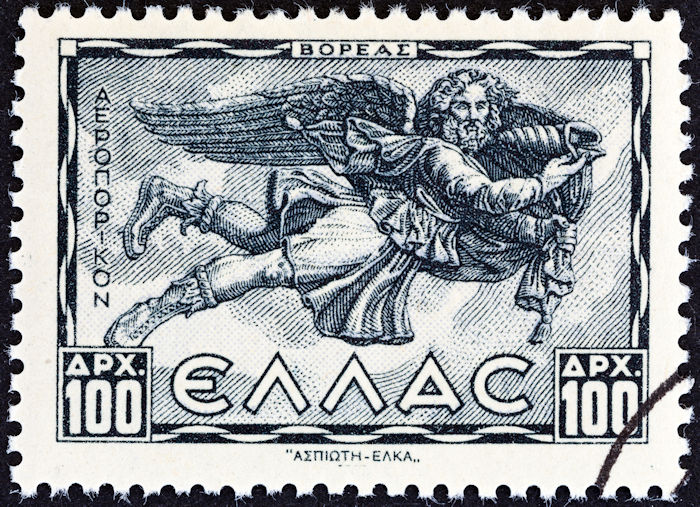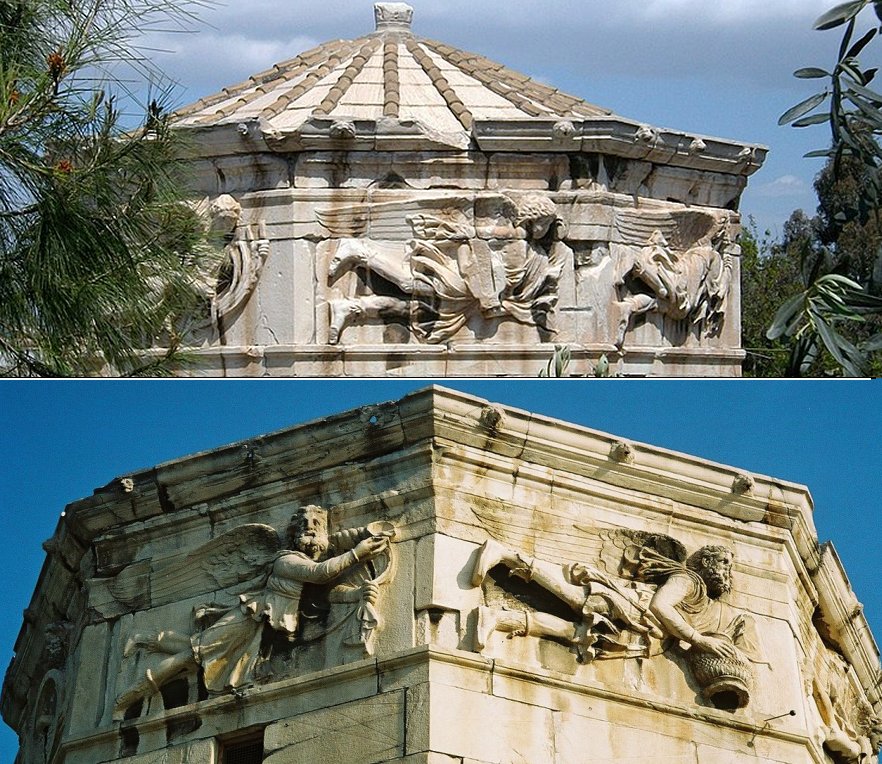Boreas – Mighty North Wind God In Greek Mythology
A. Sutherland - AncientPages.com - In Greek mythology, the Anemoi are the personifications of the winds, and their origin indicates a connection with the elemental forces of nature.
They are the sons of Titanides Eos, the goddess of the dawn, and Titan Astraeus (Astrajos), the god of the starry night.
Credit: Adobe Stock - Lefteris Papaulakis
One is Boreas (N)), the god of the north wind, which brings the cold winter. Others are Apeliotes (E), Kaikias (NE), Notus (S), Eurus (SE), Lips (SW), Zephyrus (W), and Skiron (NW).
Vicious and extremely strong, the Boreas (his Roman is Aquilo) had his abode in the Thracian mountains and brought the wintry north wind. Herodotus and Pliny the Elder (AD 23–79), ancient Roman nobleman, scientist, historian, and author of Naturalis Historia, describe this northern land as Hyperborea "Beyond the North Wind," where people experienced complete happiness and had extraordinarily long lifespans.
Usually flying in a chariot with swift horses (or wings) across the sky, Boreas was highly honored by the great city of Athens in the 5th century BC and even credited with destroying Persian ships with his winter winds.
It occurred when the city of Athens was threatened by Xerxes, the son of Darius the Great and the fourth King of Kings of the Achaemenid Empire, ruling from 486 to 465 BC.
The danger was so close that the people prayed to the mighty Boreas. The deity was then sent tremendous winds to sink 400 Persian ships. Grateful for the god's apparent help, the people of Athens established a cult dedicated to him in 480 BC.
The tower of the winds. Credit: Joanbanjo - CC BY-SA 3.0
A similar event had occurred twelve years earlier, and Herodotus wrote about the incident as follows:
" Now, I cannot say if this was really why the Persians were caught at anchor by the stormwind, but the Athenians are quite positive that, just as Boreas helped them before, so he was responsible for what happened on this occasion also. And when they went home, they built the god a shrine by the River Ilissus."
The river Ilissus plays an essential role in Greek mythology. It is a small river that rises from springs on Mount Hymettus in Attica, the territory of Athens.
The river – 'channeled underground in the first half of the twentieth century - flows southeast and south of Athens's ancient, central, fortified area. Before the diversion of its course, it used to be a tributary of the Cephissus (modern Kifisos) River. Ilissus is featured in tales of the city's legendary past as one of the two major rivers of Athens.
Notably, the banks of the Ilissus were the site of the abduction of Orithiya, daughter of the Athenian king Erechtheus, to Thrace by Boreas, god of the north wind,' wrote Annette Giesecke in her 'Classical Mythology A to Z.'
The Athenians even considered boreas as their close relative by marriage. The god kidnapped Orithyia while gathering flowers by the Ilissus River. Orithyia was an Athenian princess and daughter of Erechtheus, a legendary king and probably also a divinity of Athens.
At first, Boreas tried to plead for her favors, persuading her to marry him. However, when it failed, he wrapped the princess Orithyia up in a cloud, married her, and with her, had had two daughters, Chione, goddess of snow, and Cleopatra (the wife of Phineus) and two sons, the Boreads - Calais and Zetes, both known as the Boreads.
The abduction of Orithyia was widespread in Athens, and his depictions were popular, especially those on the Greek vases showing Boreas as a winged, bearded man in a tunic with shaggy, sometimes frosted, and spiked hair.
Pausanias, a Greek traveler and geographer of the second century AD, wrote that Boreas had snakes instead of feet, though he was usually depicted with winged human feet in art.
Written by – A. Sutherland - AncientPages.com Senior Staff Writer
Updated on March 14, 2023
Copyright © AncientPages.com All rights reserved. This material may not be published, broadcast, rewritten or redistributed in whole or part without the express written permission of AncientPages.com
More From Ancient Pages
-
 First Peoples Of Japan: Ainu Civilization And Its Unknown Origin
Ancient Mysteries | Oct 18, 2014
First Peoples Of Japan: Ainu Civilization And Its Unknown Origin
Ancient Mysteries | Oct 18, 2014 -
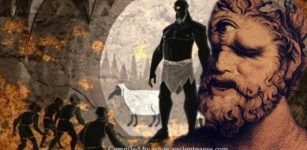 One-Eyed Giant Polyphemus – Most Famous Of The Cyclops In Greek Mythology
Featured Stories | Jan 25, 2018
One-Eyed Giant Polyphemus – Most Famous Of The Cyclops In Greek Mythology
Featured Stories | Jan 25, 2018 -
 Inscription On Rare Tetrarchic Boundary Stone Found At Biblical Site Of Abel Beth Maacah, Israel Has Been Deciphered
Archaeology | Jan 21, 2025
Inscription On Rare Tetrarchic Boundary Stone Found At Biblical Site Of Abel Beth Maacah, Israel Has Been Deciphered
Archaeology | Jan 21, 2025 -
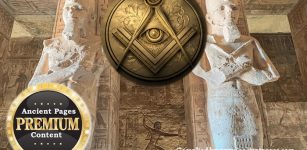 Secret Hidden Freemasonic Messages Concealed In Ancient Egyptian Artifacts And Roman Works – A Misunderstood Object? – Part 1
Ancient Mysteries | Feb 18, 2022
Secret Hidden Freemasonic Messages Concealed In Ancient Egyptian Artifacts And Roman Works – A Misunderstood Object? – Part 1
Ancient Mysteries | Feb 18, 2022 -
 3,800-Year-Old Cuneiform Clay Tablet With Agreement To Purchase A City Discovered In An Ancient Tumulus In Turkey
Archaeology | Aug 11, 2023
3,800-Year-Old Cuneiform Clay Tablet With Agreement To Purchase A City Discovered In An Ancient Tumulus In Turkey
Archaeology | Aug 11, 2023 -
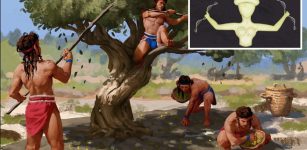 Ancient DNA Reveals “Completely Unexpected” Marriage Rules In Minoan Crete
Archaeology | Jan 16, 2023
Ancient DNA Reveals “Completely Unexpected” Marriage Rules In Minoan Crete
Archaeology | Jan 16, 2023 -
 Advanced Ancient Civilization’s Encounter With Primitive People Led To Something Extraordinary – Thought-Provoking Theory Suggests
Ancient Mysteries | Dec 19, 2018
Advanced Ancient Civilization’s Encounter With Primitive People Led To Something Extraordinary – Thought-Provoking Theory Suggests
Ancient Mysteries | Dec 19, 2018 -
 Sibylline Books: Ancient Prophecies Destroyed By Fire
Featured Stories | Feb 17, 2016
Sibylline Books: Ancient Prophecies Destroyed By Fire
Featured Stories | Feb 17, 2016 -
 Hyperborea Or Atlantis Ruins – Underground Secrets Of The Sacred Lake On The Arctic Circle
Civilizations | Nov 17, 2014
Hyperborea Or Atlantis Ruins – Underground Secrets Of The Sacred Lake On The Arctic Circle
Civilizations | Nov 17, 2014 -
 12 Masonic Symbols Explained
Ancient Symbols | Jul 2, 2018
12 Masonic Symbols Explained
Ancient Symbols | Jul 2, 2018 -
 On This Day In History: The Peace Of Etaples Signed Between Kings Of France And England – On Nov 3, 1492
News | Nov 3, 2016
On This Day In History: The Peace Of Etaples Signed Between Kings Of France And England – On Nov 3, 1492
News | Nov 3, 2016 -
 Two Unique Antiquity-Dated Discoveries Have Been Made In The Ancient City of Agrigento, Sicily
Archaeology | Apr 15, 2025
Two Unique Antiquity-Dated Discoveries Have Been Made In The Ancient City of Agrigento, Sicily
Archaeology | Apr 15, 2025 -
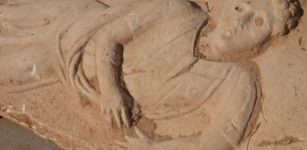 Unique 1,800-Year-Old Stone Sarcophagus Exposed In Ashkelon Building Site
Civilizations | Sep 6, 2015
Unique 1,800-Year-Old Stone Sarcophagus Exposed In Ashkelon Building Site
Civilizations | Sep 6, 2015 -
 Why Did Vikings Carry Decorative Swords That Were Useless In Combat?
Ancient History Facts | Jun 8, 2024
Why Did Vikings Carry Decorative Swords That Were Useless In Combat?
Ancient History Facts | Jun 8, 2024 -
 Ancient Marble Statue Of Sphinx Discovered In Tang Dynasty Tomb
Archaeology | Dec 16, 2015
Ancient Marble Statue Of Sphinx Discovered In Tang Dynasty Tomb
Archaeology | Dec 16, 2015 -
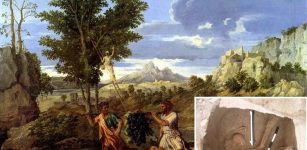 Mysterious Biblical Canaanites – What Ancient DNA Reveals About Their Fate
Archaeology | Jul 28, 2017
Mysterious Biblical Canaanites – What Ancient DNA Reveals About Their Fate
Archaeology | Jul 28, 2017 -
 Dangerous Anomaly Inside Mysterious European Mountain Remains Unexplained – Unusual Ancient Connections – Part 1
Ancient Mysteries | Mar 13, 2021
Dangerous Anomaly Inside Mysterious European Mountain Remains Unexplained – Unusual Ancient Connections – Part 1
Ancient Mysteries | Mar 13, 2021 -
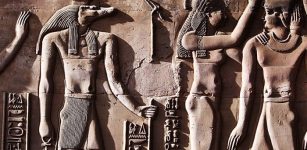 Sobek – Enigmatic Crocodile God Of Ancient Egypt
Civilizations | Sep 5, 2015
Sobek – Enigmatic Crocodile God Of Ancient Egypt
Civilizations | Sep 5, 2015 -
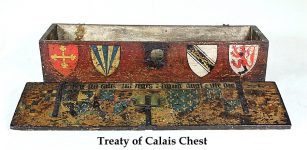 On This Day In History: Treaty of Calais Ratified Between France And England – On Oct 24, 1360
News | Oct 24, 2016
On This Day In History: Treaty of Calais Ratified Between France And England – On Oct 24, 1360
News | Oct 24, 2016 -
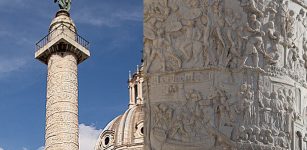 Trajan’s Column – A Roman Triumphal Column In Ancient Rome
Ancient History Facts | Aug 31, 2021
Trajan’s Column – A Roman Triumphal Column In Ancient Rome
Ancient History Facts | Aug 31, 2021

